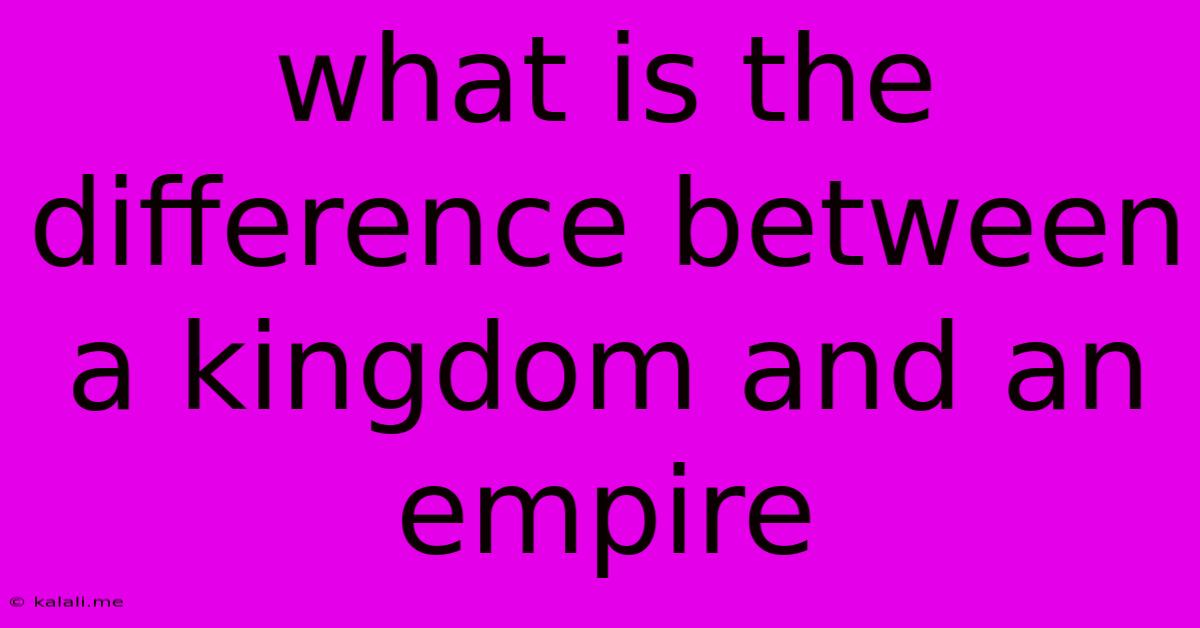What Is The Difference Between A Kingdom And An Empire
Kalali
Jun 13, 2025 · 3 min read

Table of Contents
Kingdom vs. Empire: Unpacking the Differences Between Two Forms of Governance
Understanding the difference between a kingdom and an empire often boils down to scale, legitimacy, and the nature of their rule. While both represent forms of political organization with a ruler at the head, their scope and the way they achieve and maintain power differ significantly. This article will delve into these key distinctions, exploring the nuances that set kingdoms and empires apart.
What is a Kingdom?
A kingdom is typically defined as a state or territory ruled by a king or queen, a monarch whose authority is often considered hereditary and legitimate through a lineage, tradition, or religious belief. The ruler's power extends over a geographically defined area, often with relatively homogenous cultural and ethnic populations. Think of smaller, more unified territories with a shared identity. Key characteristics of a kingdom include:
- Hereditary Succession: The throne usually passes down through a family line, often with established rules of inheritance.
- Limited Geographic Scope: Kingdoms tend to be smaller and more geographically concentrated than empires.
- Homogenous Population: Kingdoms often exhibit a greater degree of cultural and ethnic unity among their subjects.
- Legitimacy through Tradition: The king or queen's authority frequently derives from long-standing traditions, customs, and sometimes religious sanction.
What is an Empire?
An empire, on the other hand, is a much broader and more complex political entity. It's characterized by its extensive size, encompassing diverse territories, cultures, and peoples under the rule of a single, powerful sovereign or ruling body. Empires often emerge through conquest, expansion, and the subjugation of other groups. This makes legitimacy a much more fluid concept, often relying on military might and political maneuvering rather than solely on tradition. Key aspects of an empire include:
- Extensive Territorial Reach: Empires are significantly larger and more geographically dispersed than kingdoms.
- Heterogeneous Population: Empires typically rule over a diverse population with varying cultures, languages, and religions.
- Centralized Authority: Empires require a strong central government to manage their vast territories and diverse populations.
- Legitimacy Through Power: While some empires might draw on traditional or religious legitimacy, their dominance often relies heavily on military strength and political control. Maintaining order in such a diverse and expansive territory requires a powerful and efficient administrative system.
- Conquest and Expansion: The growth of empires frequently occurs through military conquest and the assimilation or subjugation of other territories and peoples.
Key Differences Summarized:
| Feature | Kingdom | Empire |
|---|---|---|
| Size | Relatively small, geographically concentrated | Vast, geographically dispersed |
| Population | Relatively homogenous | Highly heterogeneous |
| Rule | Hereditary monarch, often with traditional legitimacy | Emperor/Empress, often through conquest and centralized power |
| Expansion | Limited, often organic growth | Significant, often through conquest |
| Legitimacy | Tradition, heredity, religious sanction | Military power, political control |
Overlapping Territories and Blurred Lines:
It's crucial to understand that the line between a kingdom and an empire can be blurry. Some kingdoms have expanded to imperial proportions over time, while some empires have incorporated elements of traditional legitimacy into their rule. The terms are not always mutually exclusive; a kingdom might be part of a larger empire, or an empire might be composed of several smaller kingdoms that retain a degree of autonomy.
Understanding the distinctions between kingdoms and empires offers valuable insight into the complexities of historical and contemporary political structures. By examining the size, population, method of rule, and legitimacy, we gain a deeper appreciation for the diverse ways in which societies have been organized and governed throughout history.
Latest Posts
Latest Posts
-
Which Of The Following Is An Example Of Symbiosis
Jun 14, 2025
-
Select The Word That Means Present From Birth
Jun 14, 2025
-
Which Of The Following Statements Is Not True About Friction
Jun 14, 2025
-
Middle Tennessee State University Act Requirements
Jun 14, 2025
-
How Long Is The Penalty Spot From The Goal
Jun 14, 2025
Related Post
Thank you for visiting our website which covers about What Is The Difference Between A Kingdom And An Empire . We hope the information provided has been useful to you. Feel free to contact us if you have any questions or need further assistance. See you next time and don't miss to bookmark.